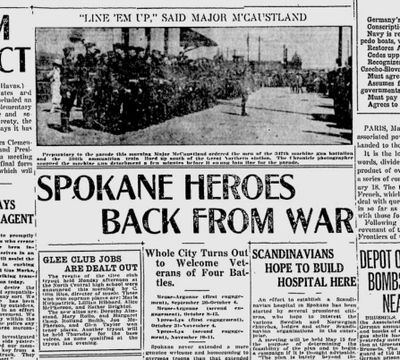100 years ago in Spokane: Soldiers, terrier celebrate return from World War I

Spokane gave an enthusiastic welcome to the 91st Infantry Division as more soldiers returned from World War I.
“Spokane never extended a more genuine welcome and homecoming to overseas troops,” the Spokane Daily Chronicle reported.
Among those on board the Great Northern train was Mac, the “little terrier mascot of the 347th machine gun battalion.”
“Of course we didn’t take him into the trenches, but he has been with us everywhere else, which is saying something,” said F.J. Scott, of Withrow, Washington, who was eating a celebratory lunch at the Davenport Hotel with other soldiers – and Mac.
Another soldier who recently returned to Spokane was George A. Barker, “well-known Spokane dentist.” He arrived home with other members of the 91st Infantry Division. He served at the front but also worked as a dental surgeon.
“It was a terrible thing while the fighting lasted, and I don’t think anyone was any more scared than I was,” Baker said. “But no matter how scared a man might be there was enough excitement to keep him interested in what was going on, and just to see those doughboys go after the Germans was inspiration enough to make a man ashamed to do any hanging back.”
Baker was planning to open a dental office in Spokane, and his wife who had been living in Washington D.C. while Baker was overseas, was heading back to Spokane.
From the telecommunications beat: More Spokane residents were installing telephones.
In the first four months of the year, the number of phones in Spokane jumped 4%. As of April 20, 1919, records showed there were 24,697 phones installed in Spokane.
Meanwhile, the Home Telephone and Telegraph Company was facing a lawsuit from A.E. Powell in Spokane, who alleged that the company was overcharging for its services.
From the good government beat: The Spokane Daily Chronicle said Spokane Mayor Charles M. Fassett had broken into the “big league” as an author for writing a chapter in the newly published “Experts in City Government.” Among the other participants was Harvard University President A. Lawrence Lowell.
The mayor’s chapter was titled “Utility problems and expert city government.”
Fassett argued that standard politicians probably could “express the desires of his constituents as to whether or not a bridge should be built over the creek at Main street, but to put him in charge of building the bridge, or to allow him to place one of his henchmen on the job, is to take a desperate chance with the money and lives of the citizens.”
Jim Kershner is on sabbatical.